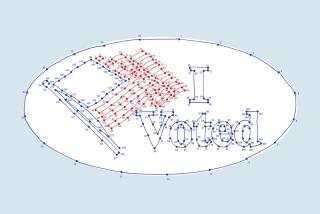Election Aides’ Help to Voters on Absentee Ballots Upheld
- Share via
SAN FRANCISCO — The California Supreme Court ruled Thursday that campaign workers may help voters fill out absentee ballots without violating state constitutional requirements for secret voting.
The justices, upholding an incorporation election in suburban East Palo Alto, held unanimously that state election laws permit a second party to take absentee ballots to voters and to assist in their completion if asked to do so.
But one member of the court, Justice Joseph R. Grodin, expressed concern over the potential for “subtle forms of coercion” by political or special-interest groups assisting such voters in casting their ballots.
Grodin noted that in the case before the court a decisive number of absentee ballots were completed in the presence, or with the assistance, of campaign workers favoring incorporation, giving “rise to the suspicion if not the actuality of coercion.”
Minimize Dangers
He called on the Legislature to tighten the rules on absentee balloting to minimize such dangers in the electoral process.
The decision came as absentee balloting has markedly increased throughout the state and has been promoted by both major political parties in certain elections. Voting-rights advocates have urged the use of absentee balloting to encourage greater election participation by low-income and elderly voters.
Lawyers for the newly incorporated city of East Palo Alto hailed the ruling, saying it would ease the way for more voters to use absentee ballots when they wish.
“The decision is important because it says that people who are elderly or handicapped or otherwise need help in voting can get it upon request and have their vote count,” said Thomas R. Adams of San Mateo, an attorney for the city.
Challenged Validity
But Paul N. McCloskey of Palo Alto, a former congressman representing a group challenging the validity of the election, condemned the ruling as “frightening in its implications.”
“It squarely upholds the right of candidates and campaign workers to go into a person’s home, ask that individual to produce an absentee ballot, mark that ballot and then carry it back to the clerk’s office,” McCloskey said. “It overturns 185 years of law protecting the right to a secret ballot.”
An appeal to the U.S. Supreme Court is “probably merited,” he added.
The case arose from a 1983 election in the largely black community south of San Francisco in which incorporation was approved by a margin of only 15 votes. With 3,549 votes cast, the absentee vote was 183 to 89 favoring incorporation.
Incorporation opponents brought suit, saying that at least 94 absentee votes had been cast illegally because of the way ballots were obtained and delivered and that there had been a breach of the right to vote in secret by pro-incorporation campaign workers.
A trial court rejected their contentions, finding that voters had voluntarily allowed campaign workers to be present while they marked the ballot or had requested help in completing the ballot. The court found also that each ballot had been marked as requested and that there was no coercion or tampering.
Signed by Court
The justices, in an opinion signed “by the court,” refused to overturn the election result and found that state election laws were intended to be construed liberally in favor of absentee voters.
They noted that there were numerous statutes--including some with criminal penalties--that can be used to ensure the secrecy and integrity of the voting process.
The court rejected as “plainly meritless” the claim that voters could not receive an absentee ballot at a place other than their residence and said it was permissible for an authorized second party to deliver such ballots to voters upon request.
“We recognize that there is some potential for abuse if campaign workers and candidates gain undue control of the distribution of absentee ballots, but elimination of this risk is a legislative task,” the court said.
Other People
The justices said further that the state constitutional requirement that “voting shall be secret” did not mean that absentee ballots could not be cast in the presence or with the help of other people--even campaign workers.
The court acknowledged that one incorporation proponent had distributed 79 absentee ballot applications and later visited several voters to see whether they had returned ballots to the county clerk. He also helped some voters complete their ballots and took some ballots to the clerk himself.
But such assistance had been provided at the request of the voter, the court noted, and to invalidate a ballot because it had not been cast in strict secrecy would improperly impair the right to vote.
More to Read
Sign up for Essential California
The most important California stories and recommendations in your inbox every morning.
You may occasionally receive promotional content from the Los Angeles Times.










